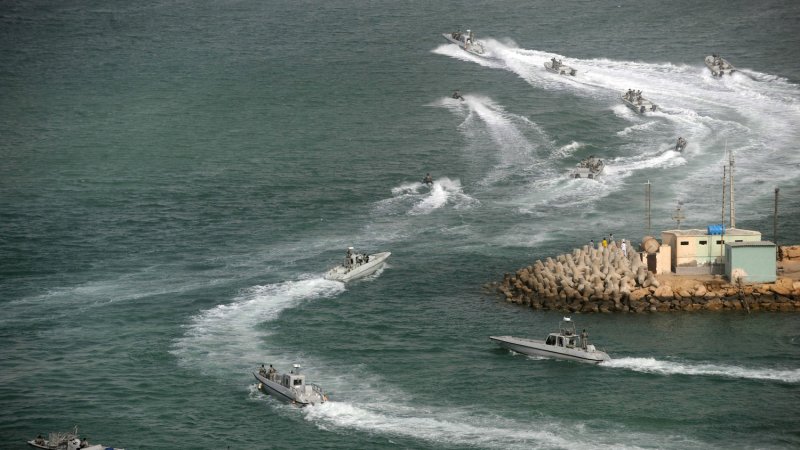Iranian navy speed boats take part in an Iranian military exercise on the Sea of Oman, near the Strait of Hormuz in southern Iran on December 30,2011. Iran has threatened to close the strategic oil waterway if sanctions are imposed on Iran for its nuclear ambitions. UPI/Ali Mohammadi/IIPA |
License Photo
DUBAI, United Arab Emirates, Oct. 18 (UPI) -- Iran has denied a report it plans to block the strategic Strait of Hormuz with a giant oil spill.
But as Iran's oil exports steadily fall because of U.S.-led sanctions, there is concern that Tehran, its economy crippled, may seek to block the gateway to the Persian Gulf one way or another.
"Fears are rising that Iran's leadership, facing increasing domestic unrest over spiraling inflation, has less and less to lose through brinkmanship in the channel now that its own oil income is being squeezed to a trickle," Javier Blas, commodities editor of the Financial Times, observes.
"Iran's plummeting oil exports mean that a cornered Tehran could see a confrontation in the strait as less an act of self-immolation and more a calculated gamble."
The oil spill threat was reported by the German newsmagazine Der Spiegel Monday, citing unidentified "Western intelligence experts" it said are privy to "top secret information."
It said the Iranian operation, codenamed "Murky Water," was intended "to both temporarily block the vital shipping channel and to force a suspension of Western sanctions."
The plan was devised by Maj. Gen. Mohammad Ali Jafari, commander of the Islamic Revolutionary Guards Corps, the most powerful military force in Iran, and was now in the hands of Supreme Leader Ayatollah Ali Khamenei, the newsmagazine reported.
Closing the narrow, 112-mile waterway, through which one-third of the world's seaborne supplies of oil passes, for more than a few days would trigger global economic disruption and push oil prices through the roof.
It would not halt oil supplies from the gulf completely. Saudi Arabia and the United Arab Emirates, the key Arab producers in the region, have in recent month developed pipelines that bypass the strait.
These would be able to carry some 40 percent of the 17 million barrels of crude shipped through the strait aboard supertankers every day. That works out at around 6.5 million barrels per day.
Iran, like Kuwait, Qatar and Bahrain, has no alternative routes and its oil exports would be completely halted if it shuts down Hormuz.
The major impact of a closure would be in Asia, now the main market for gulf oil. Japan imports 82 percent of its crude from the gulf, India 63 percent and China 42 percent.
In 2011, the United States got only 16 percent of its oil imports from the gulf, down from 24.5 percent in 1990.
Qatar's exports of liquefied natural gas, totaling 2 trillion cubic feet a year, would be halted completely.
Vital imports, such as food, for all the gulf states, including Iran, would be critically impeded.
Iran's oil exports comprise some 90 percent of its earnings.
The economic sanctions imposed on the Islamic Republic over the last couple of years by the United Nations, the United States and the European Union are aimed are throttling Iran's oil exports, its economic jugular.
Iranian oil production has been slashed from around 3 million bpd in early 2011 to under 1 million bpd in September, the lowest in decades, precipitating the collapse of its currency, the rial.
"If exports were to drop much further, the incentives on Iran to shut down the strait would grow, as it would not need to worry so much about its oil flown," the FT's Blas observed.
In the last week, the United States and the EU have tightened the sanctions, closing loopholes in existing sanctions and upgrading penalties for those who aid Iran's petroleum, petrochemical, insurance, shipping and financial sectors.
The large military force the United States has built up in the gulf region to confront Iran, primarily naval and air assets, has been conducting exercises that focus on keeping the Strait of Hormuz open.
The main dangers so far had been identified as sea mines, of which Iran has a large stock, anti-ship missiles, and blocking the U-shaped waterway with sunken ships. It's not clear if anyone thought of a massive oil spill.
However, a major exercise, in which a score of other nations participated, to locate and neutralize 29 simulated mines failed to find less than half of them, Western naval sources say.
Since Iran is believed to 2,000 advanced Russian and Chinese mines, the prospect of U.S.-led forces being able to contend with the real thing doesn't look good.















